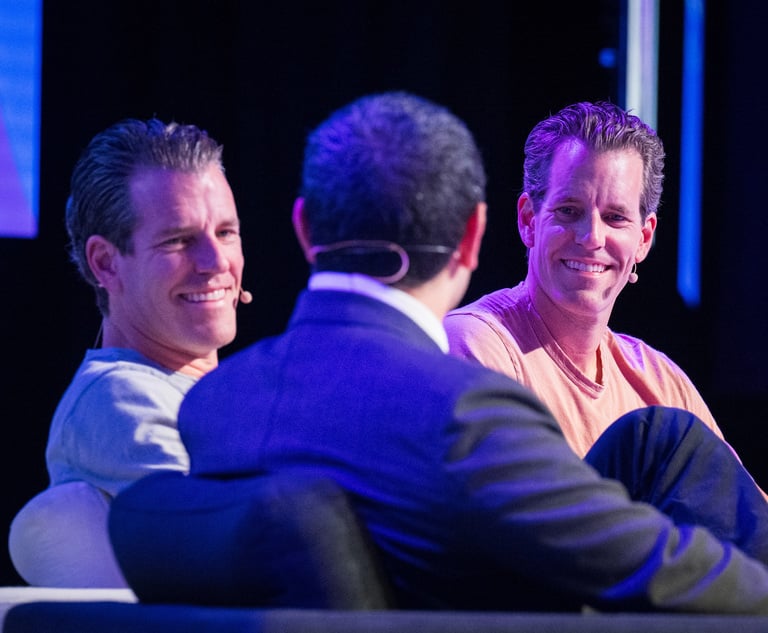5 Takeaways From Qualcomm's 9th Circuit Antitrust Appeal
Things did not go so well for the Federal Trade Commission, or the Department of Justice for that matter, at a hearing before the U.S. Court of Appeals for the Ninth Circuit.
February 14, 2020 at 09:09 PM
4 minute read

The original version of this report was published on the biweekly IP briefing Skilled in the Art.
The Federal Trade Commission and Qualcomm brought their antitrust fight to the U.S Court of Appeals for the Ninth Circuit on Thursday. Ninth Circuit Judges Johnnie Rawlinson and Consuelo Callahan and U.S. District Judge Stephen Murphy III, visiting from Michigan, entertained an hourlong argument. Here are five takeaways on the proceedings from IP reporter Scott Graham.
1. Qualcomm is going to get at least a partial victory. This panel sounded extremely cool to the FTC's primary theory of antitrust liability, that Qualcomm abused its dominant position as a modem chip supplier to extract unreasonable royalties from smartphone makers. "Is that just maybe over-capitalistic, but not necessarily anti-competitive?" Callahan asked at one point, summarizing the tenor of the questioning.
The bottom-line question seemed to be whether the court will give U.S. District Judge Lucy Koh a second try on the FTC's alternate theory of liability, or end the case right now. Qualcomm attorney Tom Goldstein of Goldstein & Russell seemed to smell blood in the water. "I think the parties agree that everyone would benefit if the court doesn't stop with the duty-to-deal question, and does address the fundamental issue of whether there's a harm to the competitive process," he told the court.
2. Qualcomm admitted the error of its ways (at least for purposes of the argument). I've said for the last year that Koh's painstaking fact-finding would be the toughest obstacle for Qualcomm on appeal. Goldstein wisely didn't force the issue.
"Do you disagree about the assumption that you have monopoly power?" Rawlinson asked him at the outset of the hearing.
"We do not," Goldstein replied. "In this court, we're trying to be very careful and conscious of the clearly erroneous standard as it comes to factual findings."
The judges looked relieved, and Goldstein was freed up to focus the rest of his argument on what he characterized as Koh's legal error.
3. Was the Supreme Court watching? It was hard not to imagine that the advocacy on display Thursday would play well at 1 First St. Goldstein was his usual effective self, while the FTC's attorney, Stanford professor and former Assistant to the Solicitor General Brian Fletcher, admirably parried hostile questions while steering back to the FTC's strengths. "I think you're doing great," Murphy told him at one point.
4. The Justice Department got a chilly reception. DOJ is opposing the FTC as Qualcomm's amicus curiae, something Rawlinson found "really interesting." Deputy Assistant Attorney General Michael Murray of the Antitrust Division argued that Koh entered her injunction "without proper consideration of the public interest, including national security concerns."
Rawlinson asked how national security plays into antitrust law. "Is there a case that supports that proposition, or is this a policy argument?" she asked.
"You haven't offered any market analysis or any sort of financial evidence" to support a national security argument, Murphy added.
Murray reminded the court that Defense and Energy Department officials filed declarations warning of the dangers of disrupting the 5G licensing landscape. He said DOJ simply wants any injunction to be narrowly tailored.
"How could the injunction be more narrowly tailored, from your perspective?" Rawlinson asked.
Murray didn't want to go there. "That would be up to the district court after hearing additional…"
"But what would your position be?" Rawlinson pressed. "Do you have a position as you stand here today?"
"I can't enumerate all of our suggestions at this point," Murray began.
"Can you enumerate one?" Rawlinson asked.
Murray said excluding 5G licensing and standard setting, which were beyond the scope of the trial, would be one possibility.
5. Why are we here? As a district judge, Murphy has presided over a handful of patent cases. And he knows which court they get appealed to. "Why don't we let the OEMs exercise their rights in patent law to file predatory pricing, monopoly, abusive patent claims, whatever?" he asked Fletcher. "And then the Federal Circuit can deal with it, who does this stuff all the time."
Fletcher once again steered back to the factual record. "What OEM after OEM testified is that we can't do that, because when we try to invoke our ordinary patent law remedies, Qualcomm says, 'Stop it, or we'll stop selling you chips.'"
This content has been archived. It is available through our partners, LexisNexis® and Bloomberg Law.
To view this content, please continue to their sites.
Not a Lexis Subscriber?
Subscribe Now
Not a Bloomberg Law Subscriber?
Subscribe Now
NOT FOR REPRINT
© 2025 ALM Global, LLC, All Rights Reserved. Request academic re-use from www.copyright.com. All other uses, submit a request to [email protected]. For more information visit Asset & Logo Licensing.
You Might Like
View All
‘Not a Regulatory Gray Area’: CFTC Secures $5M Settlement From Gemini
3 minute read
Apple Agrees to Pay $95 Million Settlement in Siri Voice Assistant Privacy Class Action

Anthropic Agrees to 'Guardrails' for Its AI Training to Protect Copyrighted Lyrics Pending Fight Over Fair Use
5 minute read
'Erroneous Assumption'?: Apple Challenges DOJ Antitrust Remedy in Google Search Monopoly Case
3 minute readTrending Stories
- 1'The Tobacco Industry of This Decade': Slew of Class Actions Accuse DraftKings of Creating Addicts
- 2Big Company Insiders See Tech-Related Disputes Teed Up for 2025
- 3Persuasive: Facebook Successfully Questions MDL Guardrails
- 4On Inauguration Eve, U.S. Attorney for Texas Exits Job
- 5Signaling Growth Goals, Some Law Firms Promote Record Partner Classes
Who Got The Work
Michael G. Bongiorno, Andrew Scott Dulberg and Elizabeth E. Driscoll from Wilmer Cutler Pickering Hale and Dorr have stepped in to represent Symbotic Inc., an A.I.-enabled technology platform that focuses on increasing supply chain efficiency, and other defendants in a pending shareholder derivative lawsuit. The case, filed Oct. 2 in Massachusetts District Court by the Brown Law Firm on behalf of Stephen Austen, accuses certain officers and directors of misleading investors in regard to Symbotic's potential for margin growth by failing to disclose that the company was not equipped to timely deploy its systems or manage expenses through project delays. The case, assigned to U.S. District Judge Nathaniel M. Gorton, is 1:24-cv-12522, Austen v. Cohen et al.
Who Got The Work
Edmund Polubinski and Marie Killmond of Davis Polk & Wardwell have entered appearances for data platform software development company MongoDB and other defendants in a pending shareholder derivative lawsuit. The action, filed Oct. 7 in New York Southern District Court by the Brown Law Firm, accuses the company's directors and/or officers of falsely expressing confidence in the company’s restructuring of its sales incentive plan and downplaying the severity of decreases in its upfront commitments. The case is 1:24-cv-07594, Roy v. Ittycheria et al.
Who Got The Work
Amy O. Bruchs and Kurt F. Ellison of Michael Best & Friedrich have entered appearances for Epic Systems Corp. in a pending employment discrimination lawsuit. The suit was filed Sept. 7 in Wisconsin Western District Court by Levine Eisberner LLC and Siri & Glimstad on behalf of a project manager who claims that he was wrongfully terminated after applying for a religious exemption to the defendant's COVID-19 vaccine mandate. The case, assigned to U.S. Magistrate Judge Anita Marie Boor, is 3:24-cv-00630, Secker, Nathan v. Epic Systems Corporation.
Who Got The Work
David X. Sullivan, Thomas J. Finn and Gregory A. Hall from McCarter & English have entered appearances for Sunrun Installation Services in a pending civil rights lawsuit. The complaint was filed Sept. 4 in Connecticut District Court by attorney Robert M. Berke on behalf of former employee George Edward Steins, who was arrested and charged with employing an unregistered home improvement salesperson. The complaint alleges that had Sunrun informed the Connecticut Department of Consumer Protection that the plaintiff's employment had ended in 2017 and that he no longer held Sunrun's home improvement contractor license, he would not have been hit with charges, which were dismissed in May 2024. The case, assigned to U.S. District Judge Jeffrey A. Meyer, is 3:24-cv-01423, Steins v. Sunrun, Inc. et al.
Who Got The Work
Greenberg Traurig shareholder Joshua L. Raskin has entered an appearance for boohoo.com UK Ltd. in a pending patent infringement lawsuit. The suit, filed Sept. 3 in Texas Eastern District Court by Rozier Hardt McDonough on behalf of Alto Dynamics, asserts five patents related to an online shopping platform. The case, assigned to U.S. District Judge Rodney Gilstrap, is 2:24-cv-00719, Alto Dynamics, LLC v. boohoo.com UK Limited.
Featured Firms
Law Offices of Gary Martin Hays & Associates, P.C.
(470) 294-1674
Law Offices of Mark E. Salomone
(857) 444-6468
Smith & Hassler
(713) 739-1250






